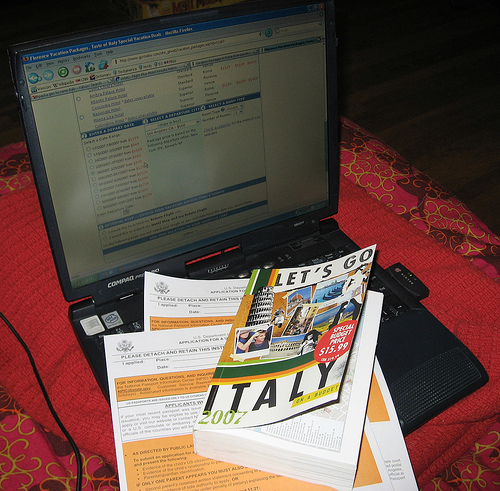Ugh. Having to spend hour upon hour and day upon day reading, surfing, and researching your next destination can quickly turn your vacation into work if you’re not careful. But without at least have an idea of where to start, you may lose out on some of the more interesting local hot spots you may never have otherwise found.
Vagabondish is reader-supported. When you buy through links on our site, we may earn a small affiliate commission. Read our disclosure.
I recently read a travel blog written by a guy who categorically refuses to use guide books. Although his stories are interesting, and he occasionally finds some gems, he also (admittedly) misses out on some of the attractions that make any place worth visiting.
I believe there is a happy medium between “winging it” entirely and following guidebook recommendations to a tee.
Guidebooks are indeed written by humans, and naturally come with a set of opinions and biases that color the work. If your travel personality doesn’t suit the guidebook writer’s, you may not find what you’re looking for. Besides, who wants to be herded towards yet another tourist trap? Because let’s face it, once a hole-in-the-wall restaurant makes it into a major guidebook, it’s no longer a quaint hole-in-the-wall; it’s a zoo.

A Little Travel Research © Hvnly
However on the flip side, if you don’t know where to start, you may never make it out of the gate. Guidebooks can provide you with a much-needed overview of where you should go according to your travel needs, budget and timeline.
Start In One Place …
Start in one place, and you shall find yourself in another if you play your cards right. I recently used a guidebook to find a beach reputedly so beautiful it rivals many world-famous beaches. Once I made it there and enjoyed the views (along with a million other people), I journeyed off to one side to talk with some locals. I started quizzing them about some other places to visit, and before I knew it I had scribbled notes and directions to three other beaches that no guidebook covers. Not to mention the dinner recommendations I received, along with a friendly beer offered over our chat.
On another occasion, I found myself at a local pier (also mentioned in the guidebooks) trying my hand at some fishing. A local (who obviously knew more about fishing than I!) took pity on me and gave me some pointers. Before the end of the conversation, I had another page of scribbles of places to see that were completely off the beaten path. Oh yeah — and another beer in my system too.
My point is, if you don’t start somewhere, you may never leave your room. Some people are happy to sit at a coffee shop, watch the world go by, read a local newspaper (even if they don’t speak the language), and tap away at a laptop. Admittedly, this is another good place to strike up conversations with locals who can show you the “real _________” (insert location name here).
But if the hostel was booked without attention to where in the city would be a good fit for your traveling style (ie: do you like to hike? Fish? Surf?), then the coffee shop might not be there, or might not offer up the right conversations.
If I want to fish for example, I start where the guidebook says to fish, find a place to stay nearby, and talk to the locals about other places to fish. As much as a place might be a tourist trap, there is surely a local in there somewhere (maybe a vendor?) who can steer you in the right direction and isn’t adverse to talking to tourists.

Leaning Bus, India © mckaysavage
Cultural Idiosyncrasies
Little did I know that unlike North America, tipping is not generally practiced in Australia and Japan, gratuity is included in France, and in China it borders on illegal (it was legalized in the 1980’s, but remains a grey area in many places).
Little did I know that in Africa, a proper handshake is done with a limp hand (a sign of weakness in North America), and is held for many minutes.
Little did I know that in many countries, using your left hand for anything (like eating, handing out something, handling money, or greeting somebody) is terribly rude and considered dirty.
These and a myriad of other cultural idiosyncrasies are illuminated by guidebooks, and can transform your travel experience from one where you feel alienated and don’t know why, to one where you are invited into people’s homes and know when to show up, what to bring, whether or not to wear shoes in the house, and how to be gracious.
So even though you may love to shoot from the hip when you travel, make sure that hip has a guidebook attached to it. Your travel experience will likely be significantly enriched for it, even if it takes you somewhere no guidebook mentions.


